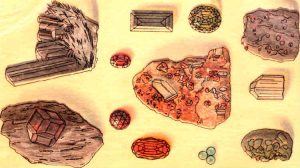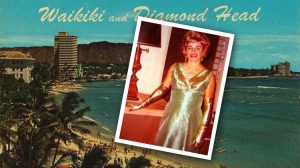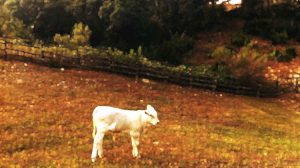
I heard that Edward Albee was giving a workshop at the Omega Institute. I attempted to sneak in using my press credentials, but Omega politely explained that “all the slots are filled.” So I resolved to meet Albee at his book-signing following the workshop, at the Omega bookstore.
As I walked up, an older man and two younger men climbed the steps of the bookshop. I overheard the older one say: “There’s a lot of bad writing in The Iceman Cometh. He’s particularly bad when he does Irish.” This was Edward Albee, speaking of Eugene O’Neill.
Albee is 76 years old. I feel compelled to use the word “dapper” to describe him. He has a mustache and slightly longish hair, carefully combed. He wears a hearing aid. There is something extremely tenacious about him.
Albee looked around the bookstore. No one was waiting in line for him.
“There’s no one here,” said Edward Albee. He must have been slightly disappointed, but he didn’t show it, except by a slight stiffening of his posture.
“I’m here,” I pointed out, walking up. “I’m someone.”
The two younger men suggested that Albee retire to the cafe next door, to await any possible book-buyers. “You can have your book signed over there,” one of them said to me.
“Actually, I don’t want to buy a book,” I explained. “I just want to meet Mr. Albee.”
The four of us walked into the Cafe. Edward Albee gestured for me to sit with him.
“What do you write?” he asked. (I had not mentioned that I was a writer.)
I always find this question difficult to answer. “Actually, I write plays, sometimes,” I said.
“You do?” he answered, surprised. “What happens to them?”
“Well, I only completed one play,” I said. “It’s based on the invasion of Afghanistan. I live in Phoenicia, New York, and they have a small play festival each year. So my play was given a staged reading at the festival, then it was published in a literary magazine called cross cultural poetics.”
“Have you read Tony Kushner’s play, Kabul/Homebody“?
(“Is that what it’s called?” I wondered. “Maybe it’s called Homebody/Kabul…”)
“No, I haven’t read it,” I said. “Did you see it?”
“Yes,” said Edward Albee. “It’s an interesting play.”
“Tony Kushner is good, don’t you think?” I asked.
“He can be.”
One of the men who had been walking with Albee appeared with a book for him to sign. Albee wrote: “From one playwright to another” and signed his name.
“This is an exciting time for plays, I believe,” I continued.
“There are a lot of possibilities,” Edward Albee said, with a faint smile. “But I don’t think there are more good plays being written now than at any other time.” He paused. “After 9/11, people were dunning us — the playwrights — because we weren’t writing about 9/11. I said to them, “Stop dunning us! It usually takes awhile. It’ll take five or six years before I write a play about it. And then it will be indirect, most likely. I don’t know yet what I think about 9/11.”
“Are you writing a play now?” I asked.
“I have a visual image in my mind, but I don’t know where it’s going.”
“Are you always writing a play?”
“I’m always doing something about writing a play.”
A young woman came in with a book for Mr. Albee to sign. It was A Delicate Balance. He signed the book, slowly and cautiously.
After she left, I said to the playwright, “You didn’t cross your name out.” Most literary writers put a line through their name on the title page, then sign their name above the line.
He smiled slightly: “No, I don’t deny my name.”
A friend of mine, Lenny Schulman, arrived, with two books: The Goat, or Who Is Sylvia? and Three Tall Women. “These are the last two plays I saw on Broadway, and they were both brilliant,” Lenny said. “And I also saw The Goat in Miami.”
“Were all four people naked in that production?” Albee asked.
“No, only the two younger ones.”
“That’s what I thought,” said Albee.
“That woman is crazy,” said Lenny. (A woman in the workshop had claimed that all four people were naked in the Miami production.)
“I guess you can’t see all the productions of your plays,” I suggested to Mr. Albee.
“No, fortunately there are too many,” he answered. “Even during the bad times, I was produced all over Europe, in cities around America, but not in New York. And if you’re not produced in New York, you don’t exist.” [He was alluding here to the 1980s, when his plays were not commercially successful.]
My friend David G. Meyers, a radio personality who attended Albee’s lecture as a guest of the playwright, appeared. He held Three Tall Women. “Can you sign it ‘To Hyacinth’?” David asked.
“How do you spell Hyacinth?” asked Edward Albee.
Mr. Albee signed the book, then one of his assistants said, “Your car is waiting.” Edward Albee shook hands all around, and departed.





Leave a Reply